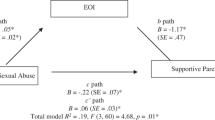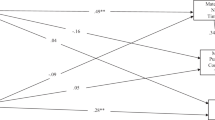Abstract
Maternal expressed emotion (EE), including maternal criticism and emotional over-involvement, is considered an index of family emotional climate that is critical for children’s psychological well-being. Limited research investigates how each element of EE differentially contributes to child behavior problems, or explores the mechanisms, such as child emotion dysregulation, through which parental EE influences child psychosocial outcomes. This study examined maternal EE, child emotion dysregulation, and child behavior problems among 60 mother–child dyads from a community sample, utilizing multi-method and multi-reporter assessment. Findings indicated that maternal expressed criticism toward the child was positively associated with child externalizing symptoms through its relation to increased child emotion dysregulation, whereas maternal emotional over-involvement was negatively associated with child externalizing symptoms through its negative relation to child emotion dysregulation. These results provided increased support for a model in which maternal criticism remains negatively associated with child psychosocial outcomes, but the construct of emotional over-involvement is not necessarily associated with youth psychosocial problems. This study also illustrated one pathway through which maternal EE influence child psychosocial functioning, thus placing EE research in the broader context of research on family emotion socialization.


Similar content being viewed by others
References
Achenbach, T. M. (1991). Manual for the child behavior checklist/4-18 and 1991 profile. Burlington: Department of Psychiatry, University of Vermont.
Asarnow, J. R., Tompson, M. C., Hamilton, E. B., Goldstein, M. J., & Guthrie, D. (1994). Family-expressed emotion, childhood-onset depression, and childhood-set schizophrenia spectrum disorders: Is expressed emotion a nonspecific correlate of child psychopathology or a specific risk factor for depression? Journal of Abnormal Child Psychology, 22, 129–146.
Asarnow, J. R., Tompson, M. C., Woo, S., & Cantwell, D. P. (2001). Is expressed emotion a specific risk for depression or a nonspecific correlate of psychopathology? Journal of Abnormal Child Psychology, 29, 573–583.
Baker, B. L., Heller, T. L., & Henker, B. (2000). Expressed emotion, parenting stress, and adjustment in mothers of young children with behavior problems. Journal of Child Psychology and Psychiatry, 41, 907–915.
Boger, K. D., Tompson, M. C., Briggs-Gown, M. J., Pavlis, L. E., & Carter, A. S. (2008). Parental expressed emotion toward children: Prediction from early family functioning. Journal of Family Psychology, 22, 784–788.
Bolton, C., Calam, R., Barrowclough, C., Peters, S., Roberts, J., Wearden, A., et al. (2003). Expressed emotion, attributions, and depression in mothers of children with problem behaviour. Journal of Child Psychology and Psychiatry, 44, 242–254.
Brown, G. W., & Rutter, M. (1966). The measurement of family activities and relationships: A methodological study. Human Relations, 19, 241–263.
Butzlaff, R. L., & Hooley, J. M. (1998). Expressed emotion and psychiatric relapse. Archives of General Psychiatry, 55, 547–552.
Caspi, A., Moffitt, T. E., Morgan, J., Rutter, M., Taylor, A., Kim-Cohen, J., et al. (2004). Maternal expressed emotion predicts children’s antisocial behavior problems: Using monozygotic-twin differences to identify environmental effects on behavioral development. Developmental Psychology, 41, 149–161.
Cassano, M., Perry-Parrish, C., & Zeman, J. (2007). Influence of gender on parental socialization of children’s sadness regulation. Social Development, 16, 210–231.
Cicchetti, D., Ackerman, B. P., & Izard, C. E. (1995). Emotions and emotion regulation in developmental psychopathology. Development and Psyhcopathology, 7, 1–10.
Cruise, R. C., Sheeber, L. B., & Tompson, M. C. (2011). Behavioral correlations of maternal expressed emotion in interaction tasks. Journal of Family Psychology, 25, 781–784.
Daley, D., Sonuga-Barke, E. J., & Thompson, M. (2003). Assessing expressed emotion in mothers of preschool AD/HD children: Psychometric properties of a modified speech sample. British Journal of Clinical Psychology, 42, 53–67.
Eisenberg, N., Cumberland, A., & Spinrad, T. (1998). Parental socialization of emotion. Psychological Inquiry, 9, 241–273.
Frick, P., & Morris, A. S. (2004). Temperament and developmental pathways to severe conduct problems. Journal of Clinical Child and Adolescent Psychology, 33, 54–68.
Gottman, J. M., Katz, L. F., & Hooven, C. (1996). Parental meta-emotion philosophy and the emotional life of families: Theoretical models and preliminary data. Journal of Family Psychology, 3, 243–268.
Gravener, J. A., Rogosch, F. A., Oshri, A., Narayan, A. J., Cicchetti, D., & Toth, S. L. (2012). Maternal expressed emotion, and toddler behavior problems and attachment. Journal of Abnormal Child Psychology, 40, 803–813.
Hirshfeld, D. R., Biederman, J., Brody, L., & Faraone, S. V. (1997). Associations between expressed emotion and child behavioral inhibition and psychopathology: A pilot study. Journal of the American Academy of Child and Adolescent Psychiatry, 148, 642–647.
Hooven, C., Gottman, J. M., & Katz, L. F. (1995). Parental meta-emotion structure predicts family and child outcomes. Cognition and Emotion, 9, 22–24.
Hudson, J. L., Comer, J. S., & Kendall, P. C. (2008). Parental responses to positive and negative emotions in anxious and nonanxious children. Journal of Clinical Child and Adolescent Psychology, 37, 303–313.
Jacobsen, T., Hibbs, E., & Ziegenhain, U. (2000). Maternal expressed emotion related to attachment disorganization in early childhood: A preliminary report. Journal of Child Psychology and Psychiatry, 41, 899–906.
Jenkins, J. H., & Karno, M. (1992). The meaning of expressed emotion: Theoretical issue raised by cross-cultural research. The American Journal of Psychiatry, 149, 9–21.
Kraemer, H. C., Yesavage, J. A., Taylor, J. L., & Kupfer, D. (2000). How can we learn about developmental processes from cross-sectional studies, or can we? American Journal of Psychiatry, 157, 163–171.
Laghezza, L., Delvecchio, E., Salcuni, S., Di Riso, D., Chessa, D., Lis, A., et al. (2011). Five-minute speech sample measure of expressed emotion among parents of typically developing Italian children: A pilot study. Perceptual and Motor Skills, 2, 382–392.
Leff, J., & Vaughn, C. (1985). Expressed emotion in families: Its significance for mental illness. New York: Guilford Press.
Magana-Amato, A. (2012). Manual for Coding Expressed Emotion from the Five Minute Speech Sample. Unpublished manual from the author.
Magana-Amato, A., Goldstein, J., Karno, M., Miklowitz, D. J., Jenkins, J., & Falloon, I. R. (1986). A brief method for assessing expressed emotion in relatives of psychiatric patients. Psychiatry Research, 17, 203–212.
Morris, A., Silk, J. S., Steinberg, L., Myers, S. S., & Robinson, L. R. (2007). The role of family context in the development of emotion regulation. Social Development, 16, 338–361.
Peris, T. S., & Hinshaw, S. P. (2003). Family dynamics and preadolescent girls with AD/HD: The relationship between Expressed Emotion, AD/HD symptomatology, and comorbid disruptive behavior. Journal of Child Psychology and Psychiatry, 44, 1177–1190.
Preacher, K. J., & Hayes, A. F. (2008). Asymptotic and resampling strategies for assessing and comparing indirect effects in multiple mediator models. Behavior Research Methods, 40, 879–891.
Psychogiou, L., Daley, D. M., Thompson, M. J., & Sonuga-Barke, E. J. S. (2007). Mothers’ expressed emotion toward their school-aged sons: Associations with child and maternal symptoms of psychopathology. European Child and Adolescent Psychiatry, 16, 458–464.
Rein, Z., Perdereau, F., Curt, F., Jeammet, P., Fermanian, J., & Godart, N. (2006). Expressed emotion and anorexia nervosa: The validation of the five minute speech sample in reference to the Camberwell family interview. International Journal of Eating Disorders, 39, 217–223.
Rogosch, F. A., Cicchetti, D., & Toth, S. L. (2004). Expressed emotion in multiple subsystems of the families of toddlers with depressed mothers. Development and Psychopathology, 6, 689–709.
Seed, S. J., & Weiss, M. S. (2002). Maternal expressed emotion as a predictor of emotional and behavioral problems in low birth weight children. Issues in Mental Health Nursing, 23, 649–672.
Shields, A., & Cicchetti, D. (1997). Emotion regulation among school-age children: The development and validation of a new criterion Q-sort scale. Developmental Psychology, 33, 906–916.
Shimodera, S., Mino, Y., Inoue, S., Izumoto, Y., Kishi, Y., & Tanaka, S. (1999). Validity of a five-minute speech sample in the families of patients with schizophrenia in Japan. Comprehensive Psychiatry, 40, 372–376.
Southam-Gerow, M. A., & Kendall, P. C. (2002). Emotion regulation and understanding: Implications for child psychopathology and therapy. Clinical Psychology Review, 22, 189–222.
Stern, E. H. (2002). Expressed emotion and interaction patterns in mothers with anxiety disorders and their children. Dissertation Abstracts International, B: The Sciences and Engineering, 63, 1050.
Stubbe, D. E., Zahner, G. E. P., Goldstein, M. J., & Leckman, J. F. (1993). Diagnostic specificity of a brief measure of expressed emotion: A community study of children. Journal of Child Psychology and Psychiatry, 34, 139–154.
Suveg, C., & Zeman, J. (2004). Emotion regulation in children with anxiety disorders. Journal of Clinical and Child Psychology, 33, 750–759.
Thompson, R. A. (1994). Emotion regulation: A theme in search of definition. Monographs of the Society for Research in Child Development, 59, 25–52.
Thompson, R. A., & Meyer, S. (2007). Socialization of emotion regulation in the family. In J. J. Gross (Ed.), Handbook of emotion regulation (pp. 249–268). New York: Guilford.
Tompson, M. C., Pierre, C. B., Boger, K. D., McKowen, J. W., Chan, P. T., & Freed, R. D. (2010). Maternal depression, maternal expressed emotion, and youth psychopathology. Journal of Abnormal Child Psychology, 38, 105–117.
Vaughn, C., & Leff, J. (1976). The measurement of expressed emotion in the families of psychiatric patients. British Journal of Social and Clinical Psychology, 15, 157–165.
Zeman, J., Perry-Parish, C., & Cassano, M. (2010). Parent-child discussions of anger and sadness: The importance of parent and child gender during middle childhood. In A. K. Root & S. A. Denham (Eds.), The role of gender in the socialization of emotion: Key concepts and critical issues. New Directions for Child and Adolescent Development (Vol. 128, pp. 65–83). San Francisco: Jossey-Bass.
Acknowledgments
This research received support from the University of Georgia Research Foundation, a UGA Graduate School Dean’s Award, the Shangshan Foundation, and Beijing Natural Science Foundation (5144028).
Author information
Authors and Affiliations
Corresponding author
Rights and permissions
About this article
Cite this article
Han, Z.R., Shaffer, A. Maternal Expressed Emotion in Relation to Child Behavior Problems: Differential and Mediating Effects. J Child Fam Stud 23, 1491–1500 (2014). https://doi.org/10.1007/s10826-014-9923-6
Published:
Issue Date:
DOI: https://doi.org/10.1007/s10826-014-9923-6




